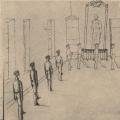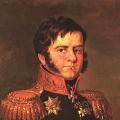Essay-reasoning on the topic: “A moral person for me.” Is a sympathetic person a moral person? (School essays)
The poem is not just malicious, but somehow sharply self-critical. Or rather, it was not at all justifiable to the moral society of the time when Nekrasov worked. And it seems that everything in this work is clear and, moreover, everything in it is correct.
If you look from the outside, the husband saved the family from shame by exposing his wife in treason, and gave his daughter a brilliant future by marrying her to an adult wealthy person, and debt is worth paying, no matter how close a friend you are.
It would seem that everything is correct, what’s wrong with that, as long as a person follows a moral approach to life. He’s not a killer, he just wants to do what he thinks will be good for everyone. But for some reason his wife dies from shame, his daughter dies from an unequal marriage, the peasant whom he brought into the public suddenly drowned himself, a friend, imprisoned for non-payment of a debt, dies. What are they doing? Still right, still right. The actions of a person of moral integrity could not lead to such results. But…
After each part of the poem it is repeated like a mantra: “I have never done harm to anyone in my life.” This sounds both like conviction and justification. Indeed, it is not he who is to blame for their misfortunes, but they themselves.
After all, there was no need to change so as not to die of shame. There was no need to fall in love with just anyone, so as not to die of consumption in rich family, there was no need to quarrel with the master and then drown himself. And in the end, there was no need to borrow, so as not to pay it back later and end up in prison. This person sincerely believes that he did no harm.
All his actions, according to his logic, brought only salvation and did as much as possible better life the people themselves. What's wrong here? He simply acted in a way that benefited only him. Saved himself from shame and from being called a “cuckold” by society.
He saved his daughter from a miserable existence and saved his wallet from spending it on his daughter’s needs. He trained his peasant to be a cook and began to eat well, but he could not restrain himself and tried to teach the man to speak well. And, in the end, he tried to get back what was his. That is, it turned out that these people brought themselves to a critical state and he had nothing to do with their deaths.
Nekrasov speaks again and again in his poems about the moral principles of that time. He exposes those who, under the guise of morality, do evil, accuses such “quiet scoundrels” of meanness, arrogance and, oddly enough, immorality.
Nikolai Nekrasov - Moral Man: Verse

Living according to strict morals,
In the evening I went to my lover;
And he convicted... He called out: I didn’t fight!
Tormented by shame and sadness...
Living according to strict morals,
I have never done harm to anyone in my life.
And she married a gray-haired rich man.
Their house was brilliant and full like a cup;
Living according to strict morals,
I gave the peasant as a cook:
But he often left the yard
Fatherly flogged him with a canal,
He drowned himself: he was crazy!
Living according to strict morals,
I have never done harm to anyone in my life.
I hinted to him in a friendly way,
I left it to the law to judge us:
Living according to strict morals,
I have never done harm to anyone in my life.
Nikolai Nekrasov - Living in accordance with strict morality (A moral person)

I have never done harm to anyone in my life.
My wife, covering her face with a veil,
No. 4 In the evening I went to see my lover.
I sneaked into his house with the police
And he caught it. He called - I didn’t fight!
She went to bed and died
No. 8 Tormented by shame and sadness.
Living according to strict morals,
I have never done harm to anyone in my life.
My friend did not present the debt to me on time.
No. 12 I, having hinted in a friendly way to him,
The law sentenced him to prison.
He died in it without paying altyn,
No. 16 But I’m not angry, even though I have a reason to be angry!
I forgave him the debt on the same date,
Honoring him with tears and sadness.
Living according to strict morals,
No. 20 I have never done harm to anyone in my life.
I gave the peasant as a cook,
It was a success; a good cook is happiness!
But he often left the yard
No. 24 And I call it an indecent addiction
Had: loved to read and reason.
I, tired of threatening and scolding,
Fatherly flogged him with a canal;
No. 28 He drowned himself, he was crazy!
Living according to strict morals,
I have never done harm to anyone in my life.
I had a daughter; fell in love with the teacher
No. 32 And she wanted to run away with him rashly.
I threatened her with a curse: she resigned herself
And she married a gray-haired rich man.
No. 36 But Masha suddenly began to turn pale and fade away
And a year later she died of consumption,
Overwhelming the whole house with deep sadness.
Living according to strict morals,
No. 40 I have never done harm to anyone in my life.
Nravstvenny chelovek
Zhivya soglasno s strictoy moralyu,
Zhena moya, zakryv litso vualyu,
Pod vecherok k lyubovniku poshla.
Ya v dom k nemu s politsiyey prokralsya
I ulichil. On vyzval - ya ne dralsya!
Ona slegla v postel i died,
Isterzana pozorom i sadyu.
Ya nikomu ne sdelal v zhizni zla.
Priatel v srok mne dolga ne predstavil.
Ya, nameknuv po-druzheski yemu,
Zakonu rassudit nas predostavil;
Zakon prigovoril yego v tyurmu.
V ney died on, ne zaplativ altyna,
No ya ne zlyus, khot zlitsya yest prichina!
Ya long yemu prostil togo zh chisla,
Pochtiv yego slezami i sadyu.
Zhivya soglasno s strogoyu moralyu,
Ya nikomu ne sdelal v zhizni zla.
Krestyanina ya otdal v povara,
On udalsya; khoroshy povar - schastye!
No often otluchalsya so dvora
I zvanyu neprilichnoye pristrastye
Imel: lyubil chitat i rassuzhdat.
Ya, utomyas grozit i raspekat,
Otecheski posek yego, kanalyu;
On vzyal da utopilsya, dur nashla!
Zhivya soglasno s strogoyu moralyu,
Ya nikomu ne sdelal v zhizni zla.
Imel ya doch; v uchitelya vlyubilas
I s nim bezhat khotela sgoryacha.
Ya pogrozil proklyatyem yey: smirilas
I vyshla za sedogo bogacha.
I dom blestyashch i polon byl kak chasha;
No stala vdrug blednet i gasnut Masha
I cherez god v chakhotke died,
Sraziv ves dom glubokoyu sadyu.
Zhivya soglasno s strogoyu moralyu,
Ya nikomu ne sdelal v zhizni zla.
Yhfdcndtyysq xtkjdtr
;bdz cjukfcyj c cnhjujq vjhfkm/,
;tyf vjz, pfrhsd kbwj defkm/,
Gjl dtxthjr r k/,jdybre gjikf/
Z d ljv r ytve c gjkbwbtq ghjrhfkcz
B ekbxbk/// Jy dspdfk - z yt lhfkcz!
Jyf cktukf d gjcntkm b evthkf,
Bcnthpfyf gjpjhjv b gtxfkm////
Z ybrjve yt cltkfk d ;bpyb pkf/
Ghbzntkm d chjr vyt ljkuf yt ghtlcnfdbk/
Z, yfvtryed gj-lhe;tcrb tve,
Pfrjye hfccelbnm yfc ghtljcnfdbk;
Pfrjy ghbujdjhbk tuj d n/hmve/
D ytq evth jy, yt pfgkfnbd fknsyf,
Yj z yt pk/cm, )
 Alexander Pushkin - Prisoner: Verse
Alexander Pushkin - Prisoner: Verse Pearl Harbor: causes and results
Pearl Harbor: causes and results History of Russia from Rurik to Putin!
History of Russia from Rurik to Putin!